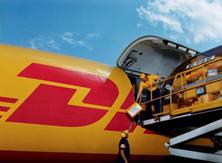DHL Express aims to cut its US losses from an expected $1.3 billion this year to about $300 millionin 2011 by outsourcing US airlift to UPS under a 10-year, $10 billion contract, shedding up to
1,800 jobs, cutting one third of its stations and using the US Postal Service for rural deliveries,it was announced today.A report earlier today in US magazine Air Cargo World about a DHL deal with FedEx and the USPostal Service, which was reported by CEP-Research, proved incorrect.
Deutsche Post World Net CEO Frank Appel stressed at a press conference in Bonn to outline thelong-awaited US Express restructuring plan that DHL Express will retain a strong competitivepresence in the US market and will continue to offer customers the same product portfolio. The dealwith UPS was a “win-win” agreement, he said.
The main objective of the plan is to reduce DHL Express USA’s underlying loss from $1 billionin 2007 and an expected $1.3 billion this year to $900 million in 2009, $500 million in 2010 and$300 million in 2011. The 2010 loss would be less than the “network value” the US express businesscontributes to DHL’s global business, Appel said. He declined to disclose the overall size of DHLExpress losses in the USA since the $1 billion acquisition of Airborne Express in 2003.
Implementation of the restructuring will start this year, key changes will be made during2009 and full completion is scheduled for 2010. The one-off implementation costs, includingcontract and lease termination charges, would be $2 billion.
Under the 10-year UPS airlift contract, which is expected to be sealed within the next threemonths, DHL Express would pay the US company $1 billion a year to fly its domestic andinternational shipments airport-to-airport within the USA and to/from Canada and Mexico. The firstDHL shipments are likely to start flying on UPS in the fourth quarter this year.
DHL Express CEO John Mullen said the existing arrangement using suppliers ABX Air and AstarAir Cargo was uncompetitive, high-cost and meant excess capacity. The UPS and DHL networks werelargely parallel, UPS had more modern and fuel-efficient planes than the current partners, and DHLwould benefit from UPS’s fully-developed multi-hub network, Mullen noted. But DHL would retain allother parts of the delivery chain from pick-up to delivery, and the two companies would remain “vigorous” competitors in the marketplace, he added.
Mullen said that once the UPS contract had been signed and anti-trust approval gained, DHLwould start to phase out use of ABX and Astar, and would also hold talks to dispose of its 49%stake in Astar. DHL’s Wilmington hub, operated by ABX Air on a sub-contract basis, will also be “impacted”, he said without adding further details.
In its own separate statement, UPS noted that the airlift contract would be similar to onealready existing with the USPS, and that it expected to handle much of the anticipated new volumethrough its existing air network, with additional capacity added beginning in 2009 upon fullimplementation.
“We believe this arrangement with DHL would represent a wise use of our assets and networkcapacity while creating a substantial and profitable revenue stream for our company,” said DavidAbney, UPS’s chief operating officer. “We want to emphasize that this would be a relativelystraightforward air lift agreement and that UPS and DHL will continue to compete in the marketplaceunder their own brands,” he added.
On the ground, DHL Express will downsize its US operation by shedding about 1,500 – 1,800 ofits 17,000 – 18,000 jobs, Mullen said. It will also close 34% of its US stations, mostly in ruralareas or where stations overlapped. He declined to say how many stations DHL Express has in theUSA.
In addition, DHL Express will rationalise its pick-up and delivery routes by 17% and itslinehaul network by 18% by re-engineering the ground route network and cutting departures to remotelocations. The existing cooperation with USPS will be expanded to cover deliveries in rural areaswhere DHL stations are closed. The impact on customers will be minimal, with only about 3.3% ofdeliveries impacted, including later deliveries through USPS, Mullen said.
DPWN CFO John Allan saidthat DHL Express was now expected to make an operating profit (EBIT) of €400 million this yearinstead of the previously expected €500 million. DHL Express would make an operating profit ofabout €1.2 billion in the rest of the world compared to an operating loss of about €800 million($1.3 billion) in the USA.












